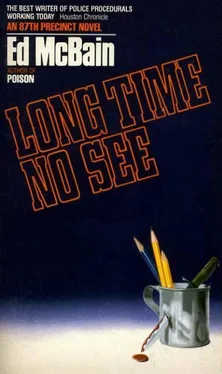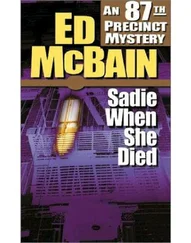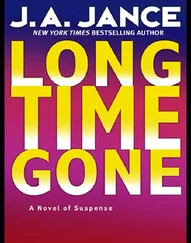“So why are you wasting time with all this Army business?” Byrnes asked.
“Well,” Carella said, “the man was having nightmares, Pete—”
“ I have nightmares, too. So what?”
“And also he’d contacted one of his old Army buddies about this deal he had in mind, whatever it was.”
That’s according to his mother,” Byrnes said.
“She seems like a reliable witness,” Carella said.
“Witness to what? ” Byrnes said. “She didn’t see this letter he’s supposed to have sent.”
“But he told her about it.”
“He told her he’d sent a letter to one of his buddies?”
“He told her the name, too.”
“But she can’t remember the name.”
“That’s right.”
“Then what the hell good is she?” Byrnes said, and picked up his coffee cup, and sipped at it, and then put it down on his desk immediately; goddamn coffee was cold “He could’ve sent the letter to anybody in Alpha — he had all their addresses, isn’t that what you said?”
“Yeah, he got them at the reunion.”
“Anyway, what’s this letter got to do with his murder? I get back to what I asked you before: why are you wasting time with all this Army business?”
“Because of the nightmares,” Carella said, and shrugged.
“What he figures,” Meyer said, “is that—”
“Does he stutter?” Byrnes asked.
“What?”
“Does Detective Carella stutter?”
“No, sir, but—”
“Then let him tell me himself what he figures.”
“I don’t know what I figure,” Carella said. “But it bothers me that Jimmy Harris remembered a rape that never happened.”
“That’s if you believe the girl.”
“I believe the girl,” Carella said.
“So do I,” Meyer said.
“What’s that got to do with the murders?” Byrnes insisted. “The man was murdered, his wife was murdered, another woman was murdered.”
“I don’t think all three murders are related,” Carella said. “I think the first two are, but I can’t see any connection—”
“He just picked another victim at random, is that what you’re saying?”
“No, not at random,” Carella said. “Well, it could have been anybody, yes, in that sense it was random. But the victim had to be blind. He deliberately chose another blind person.”
Hawes had been silent until this moment. He said now, very softly because he was in this case only peripherally and didn’t want to make waves when the lieutenant was making enough waves of his own, “It could be a smoke screen, Pete.”
“Nobody’s that dumb,” Byrnes said.
“You don’t have to be smart to kill people,” Meyer said.
“No, but you have to be dumb to try covering your tracks by killing somebody else.”
“Let’s look at the only thing we’ve got,” Carella said.
“What’s that?”
“Jimmy wrote to an Army buddy concerning a get-rich-quick scheme.”
“Okay, go ahead.”
“His mother thinks Jimmy may have had something illegal in mind.”
“Like what?”
“She was only guessing, but she figured he needed somebody who knew how to use a gun. Okay, let’s say he wrote to this person after the August reunion.”
“Why after the reunion.”
“Because he wouldn’t have known any addresses before the reunion.”
“Why didn’t he just talk to the man?”
“What do you mean?”
“At the reunion. Why didn’t he just go up to him and say TListen, I want to hold up a liquor store, are you interested?’ ”
“Maybe he didn’t get the idea till after the reunion,” Meyer said.
“Wrote to the man in September sometime,” Hawes said.
“And let’s say the man agreed to go in with Jimmy. Wrote back, or phoned him, or whatever, told him ‘Okay, I’m in, let’s rob a bank.’ ”
“Okay,” Byrnes said.
“Okay, so they hold up the bank or the liquor store or the gas station or whatever...”
“Yeah?”
“And Jimmy stashes the loot in his apartment.”
“In the window box,” Meyer said.
“And won’t tell his partner where he put it,” Hawes said.
“So his partner follows Jimmy on his way home Thursday night, and tries to get him to talk, but Jimmy won’t.”
“So the partner slits his throat, and then goes to the apartment figuring that’s where the loot is...”
“Turns the place upside down...”
“Finds the money...”
“Kills Isabel...”
“And then kills Hester Mathieson the next night...”
“To make it look like some nut’s running around killing blind people.”
“How does that sound, Pete?” Carella asked.
“It stinks,” Byrnes said.
The police psychologist was a man named Manfred Leider. His primary job was to help members of the department who were having problems that could not be solved by the use of marital aids such as those Prestige Novelty sold through the mails. Occasionally, though, a law-enforcement officer came to him for information about criminal behavior. He had dealt with detectives like Carella before; he found the man sincere but limited. All too often, even the brightest of working cops had only a peripheral knowledge of the intricacies of psychiatric techniques. This one wanted to know about dreams. Where should he begin? Basic Freud?
“What exactly do you want to know?” he asked.
They were sitting in Leider’s office on the fortieth floor of the Headquarters Building on High Street downtown. The island was narrow here; beyond the windows they could see both rivers that bounded the city. The day was cold and clear and sharp, they could see for miles into the next state.
“I’m investigating a homicide,” Carella said, “and the victim was having nightmares.”
“Mm,” Leider said. He was a man in his fifties, and he sported a graying beard that he thought made him look like a psychiatrist. In this state a psychiatrist had to go through four years of college, four years of medical school, one year of internship, three years of residency and another two years of clinical practice before taking the written and oral examinations he had to pass for a license to practice. That was why psychiatrists charged fifty dollars an hour for their services.
Leider was only a psychologist.
When Leider first began to practice, even a garage mechanic could hang out a shingle and offer his services as a “psychologist,” whatever that might have been. Times had changed; there were now stringent licensing procedures. But many psychologists, Leider among them, still felt somewhat inferior in the presence of a psychiatrist or — God forbid — that most elite and august personage, a psychoanalyst. At a tea or a soiree in the presence of such learned men, Leider often talked of glove anesthesia and eulalia and waxy flexibility. This was to show that he knew his stuff. The funny part of it was that he really did know his stuff. Leider should have gone to see a psychiatrist. A psychiatrist might have helped him with his feelings of inferiority. Instead, he spent eight hours a day in an office at the Headquarters Building downtown, where he talked to working policemen who made him feel superior.
“What sort of nightmares?” he asked.
“Well, the same nightmare each time,” Carella said.
“A recurring nightmare, do you mean?”
“Yes,” Carella said. Leider made him feel inferior. He knew that the word he’d been looking for was “recurring,” but somehow it had eluded him. Leider was wearing bifocal glasses. His eyes looked huge behind them. A crumb was clinging to his beard; he had probably just had lunch.
“Can you tell me the content of these recurring dreams?” he asked.
Читать дальше












